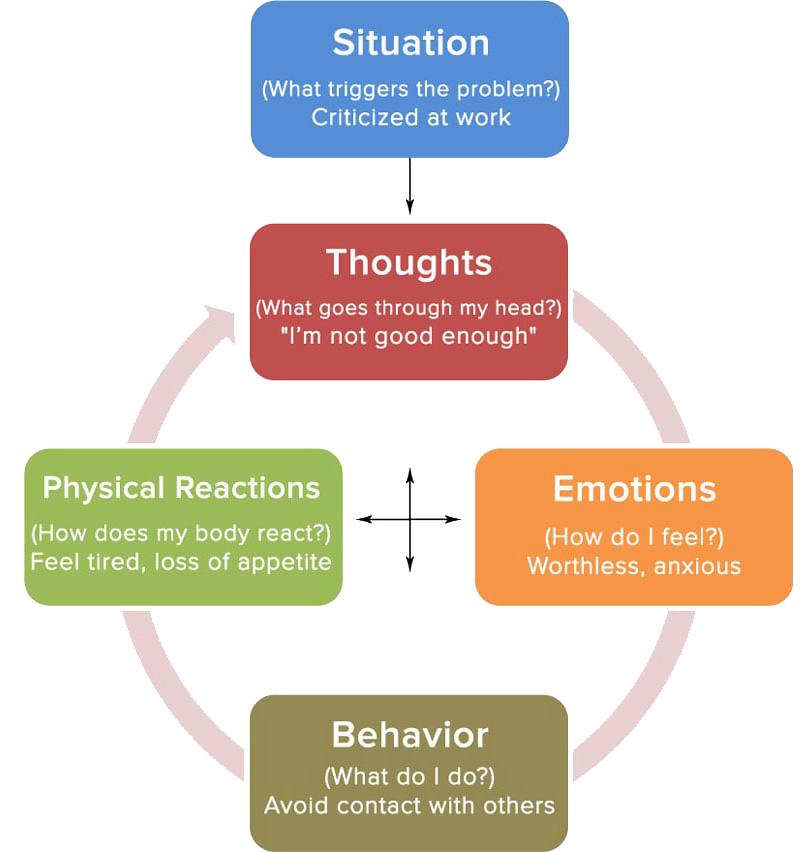Cognitive distortions are thinking patterns or simply ways that our mind convinces us of something that isn’t actually true. These inaccurate thoughts are usually used to reinforce negative thinking or emotions. Here are 10 common cognitive distortions that can contribute to negative emotions. They can also fuel catastrophic thinking patterns that are particularly disabling:
- All-or-Nothing Thinking: This is a way of thinking in black and white terms with no shades of grey. You are either a success or failure. You feel either loved or hated.
- Over-Generalization: This is a pattern of thinking about a negative event and then applying it to all events and even use it to predict future events. If you made a mistake with your school presentation, you feel you are a bad student and will always give bad presentations.
- Mental Filter: This is where you pick out a single negative detail and dwell on it exclusively, so that your vision of all reality becomes tainted.
- Discounting the Positive: You reject positive experiences by insisting they “don’t count.” If you do a good job, you may tell yourself that it wasn’t good enough or that anyone could have done as well. Discounting the positive takes the joy out of life and makes you feel inadequate and unrewarded.
- Jumping to Conclusions: This is almost like mindreading. You think you know what another person is thinking when in fact, you do not. This is a distortion because you make a conclusion with out considering all the facts.
- Magnification: This is a way of thinking where you exaggerate the importance of your problems and flaws, often minimizing the importance of your good qualities.
- Emotional Reasoning: This is a cognitive distortion where you feel a certain way or have an emotional reaction to something and then make this a reality, regardless of evidence or facts to the contrary. If I feel this way, it must be true.
- “Should statements”: You tell yourself that things should be the way you hoped or expected them to be. Should statements that are directed against other people or the world in general lead to anger and frustration: “He shouldn’t be so stubborn and argumentative.”
- Labeling: Labeling is an extreme form of all-or-nothing thinking. Instead of saying “I made a mistake,” you attach a negative label to yourself: “I’m a loser.” These labels are just useless abstractions that lead to anger, anxiety, frustration, and low self-esteem.
- Personalization: Personalization is a distortion where a person believes that everything others do or say is a direct, personal reaction to them. Some people do the opposite. They blame other people or their circumstances for their problems, and they overlook ways that they might be contributing to the problem.
CBT treatment also usually involves efforts to change behavioral patterns. These strategies might include:
- Facing fears through, instead of avoiding them.
- Using role playing to prepare for potentially problematic interactions with others.
- Learning to calm one’s mind and relax one’s body.
- Replacing a problematic behavior with a new healthier option.
Some kinds of therapy allow clients to just talk freely and randomly about issues, but CBT more than just talk, it is a structured treatment. CBT uses a process to move through treatment with a planned progression to meet the goals of therapy. The problems may be troublesome symptoms, such as sleeping badly, not being able to socialize with friends, or difficulty concentrating on reading or work. Or they could be life problems, such as being unhappy at work, having trouble dealing with an adolescent child, or being in an unhappy marriage.
These problems and goals then become the basis for planning the content of sessions and discussing how to deal with them. Typically, at the beginning of a session, the client and therapist will jointly decide on the main topics they want to work on this week. They will also allow time for discussing the conclusions from the previous session. And they will look at the progress made with the homework the client set from last appointment. At the end of the session, they will plan another assignment to do outside the sessions. This practice of rehearsing target skills can establish new behaviors that leads to positive changes in life.
















